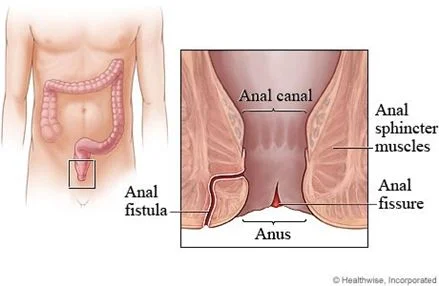Anal Fissure
If you are passing broken glass or razor blades when opening your bowels than you likely have an anal fissure.
Other symptoms include bleeding and severe pain after defecation which is often debilitating in nature.
An anal fissure is a break or tear in the skin of the anal canal.

Anal fissures may be noticed by bright red anal bleeding on toilet paper, sometimes in the toilet. If acute they may cause pain after defecation but with chronic fissures pain intensity is often less.
Anal fissures usually extend from the anal opening and are usually located posteriorly (at the back) in the midline, probably because of the relatively unsupported nature and poor perfusion of the anal wall in that location. Fissure depth may be superficial or sometimes down to the underlying sphincter muscle.
Superficial or shallow anal fissures look much like a paper cut, and may be hard to detect upon visual inspection, they will generally self-heal within a couple of weeks.
However, some anal fissures become chronic and deep and will not heal.
The most common cause of non-healing is spasm of the internal anal sphincter muscle which results in impaired blood supply to the anal mucosa. The result is a non-healing ulcer, which may become infected by faecal bacteria.
In adults, fissures may be caused by constipation, the passing of large, hard stools, or by prolonged diarrhoea. In older adults, anal fissures may be caused by decreased blood flow to the area.
Anal fissures can be healed either with medical management or surgery. Surgery for anal fissure is straight forward day surgery with minimal down time and quick recovery. It has a very high rate of success. Relief is often instantaneous.
